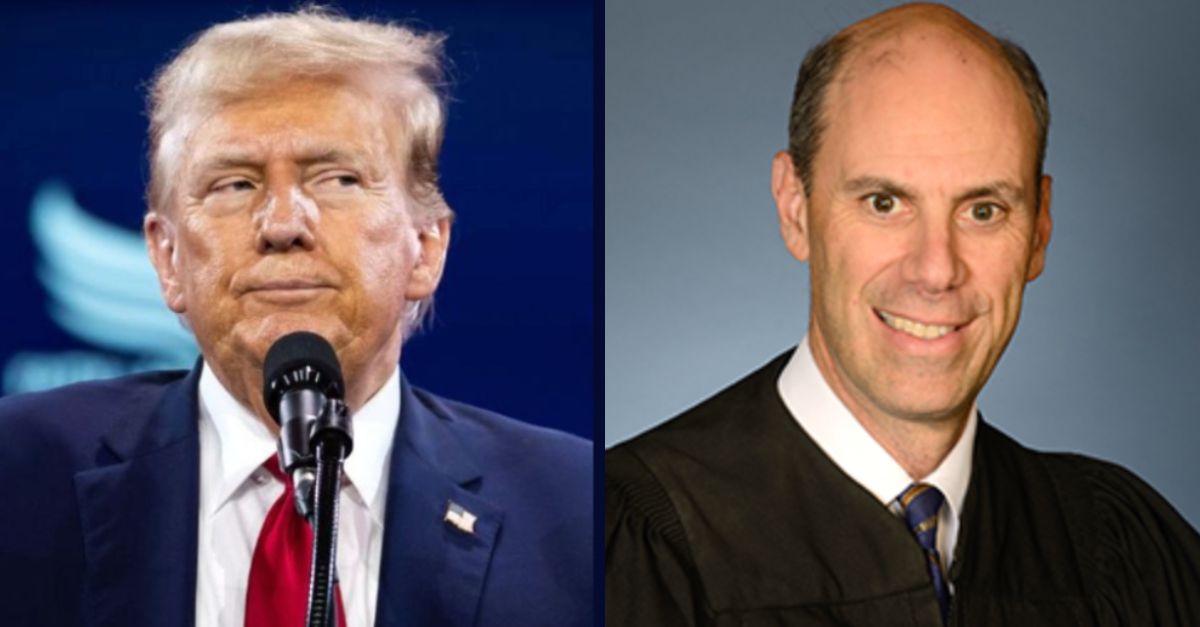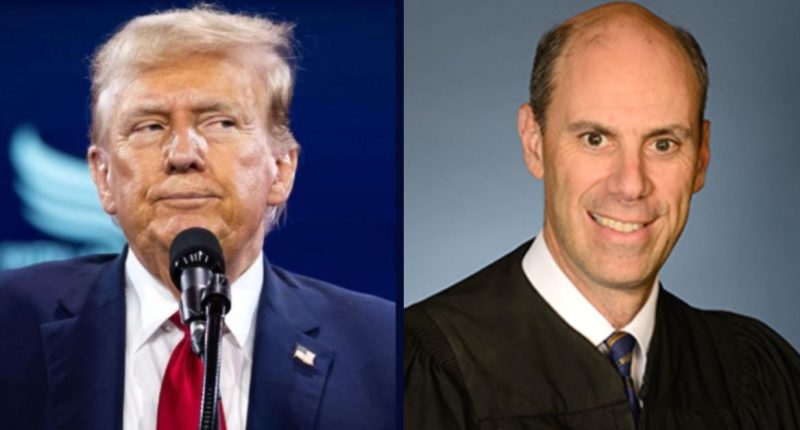
Left: Donald Trump speaks at the annual Road to Majority conference in Washington, DC, in June 2024 (Allison Bailey/NurPhoto via AP). Right: U.S. District Judge James Boasberg (U.S. District Court for the District of Columbia).
Under the turbulent glare of national attention, a federal district judge on Thursday made comity the informal order of the day — while also promising to issue a restraining order against several members of President Donald Trump’s cabinet over the Signal group chat scandal.
But first he sought to set the record straight.
“Some questions have been raised regarding this court’s random assignment,” U.S. District Chief Judge James E. Boasberg intoned — emphasizing the penultimate word. “All cases are randomly assigned.”
The jurist is, as of late, unusually well-known — largely due to being the target of Trumpworld ire over a series of anti-government court rulings and concomitant dressings-down of government lawyers in the Alien Enemies Act case. Seemingly aware of the consternation, the judge explained in detail the “automated” process that put him in charge of another high-profile case against the Trump administration.
When it came to the issues raised in the lawsuit over the multiple-day group chat about how to plan “military strikes in Yemen,” the judge pushed for clarity again — this time in service of an agreed-upon resolution that both sides would be able to live with.
“The plaintiff here is not asking me to disclose the Signal communications,” Boasberg said. “Discovery is not part of the suit.”
Boasberg went on to describe the basis of the lawsuit as, rather, sounding in a Federal Records Act (FRA) claim — a federal law with a series of mandatory record-keeping requirements with tentacles reaching into other laws like the Freedom of Information Act.
The judge said the contours of the litigation offer “a real chance to reach common ground” and that based on what the U.S. Department of Justice has filed in the case so far, he believes “the government is moving toward implementing what the plaintiffs seek.”
The lawsuit filed by nonprofit government transparency organization American Oversight specifically requests a bevy of declaratory judgments that the group chat participants violated federal law, that the messages in question are subject to the FRA, and that failure to maintain the messages violated the FRA. The plaintiffs also asked for a broad injunction that orders the defendants to comply with their duties under federal laws, and that might lead to an investigation by the U.S. Attorney General keyed toward “the recovery or restoration of any deleted or destroyed materials to the extent possible.”
All of that hardly seemed necessary, the judge suggested.
Boasberg said “preservation and possible recovery” are the key issues for the plaintiffs. He then mused that maybe the plaintiffs could reach an agreement for less relief than their lawsuit requests — if the defense is prepared to agree to such preservation efforts.
When asked what the government is willing to do here, a DOJ lawyer suggested the court credit a series of declarations filed that suggest the sued agencies are working to preserve what they can. She added that the government was “still in the process of working with the agencies to see what records they have.”
When pressed by the judge on the disappearing nature of some Signal messages, the government lawyer demurred about those details but said “the agencies are certainly looking to fulfill their obligations.”
A more sure answer came when the judge asked the DOJ lawyer about the Signal chats in question from the dates in question — and if the government was willing to preserve them.
“Yes, the agencies are working to preserve what they have,” the government’s attorney told Boasberg.
The judge and the DOJ’s lawyer ultimately agreed that preserving what the government has was an achievable goal, while recovering deleted messages might be a more thorny issue. And, when asked if a formal restraining order outlining such obligations would be too much of a burden, the government’s attorney did not answer in the negative.
During a much briefer time at the dais, American Oversight’s attorney generally appreciated what had earlier been agreed to but noted that the Signal group chat references other conversations.
The attorney said his client, as a regular FOIA requester, has “serious concerns about the use of the Signal messaging system.”
The judge acknowledged those concerns as valid, but steered the hearing toward issues of accord in line with the complaint.
“What I’m hearing from the government is they agree they can’t have record-keeping that violates the FRA,” Boasberg said.
Love true crime? Sign up for our newsletter, The Law&Crime Docket, to get the latest real-life crime stories delivered right to your inbox.
The judge told the parties he would issue a temporary restraining order enjoining the defendants “to preserve all Signal communications between March 11 and March 15 and then we’ll go forward from here.”
In what appeared to be another callback to the headwinds of his newfound national stature, Boasberg added, perhaps jokingly for the government’s benefit: “Don’t worry, it’ll be in writing.”
By Monday, the parties will have to provide a status report and declaration regarding steps taken to implement such preservation, the judge said. The temporary restraining order will last for an initial 14 days — but may be renewed as the court sees fit.








